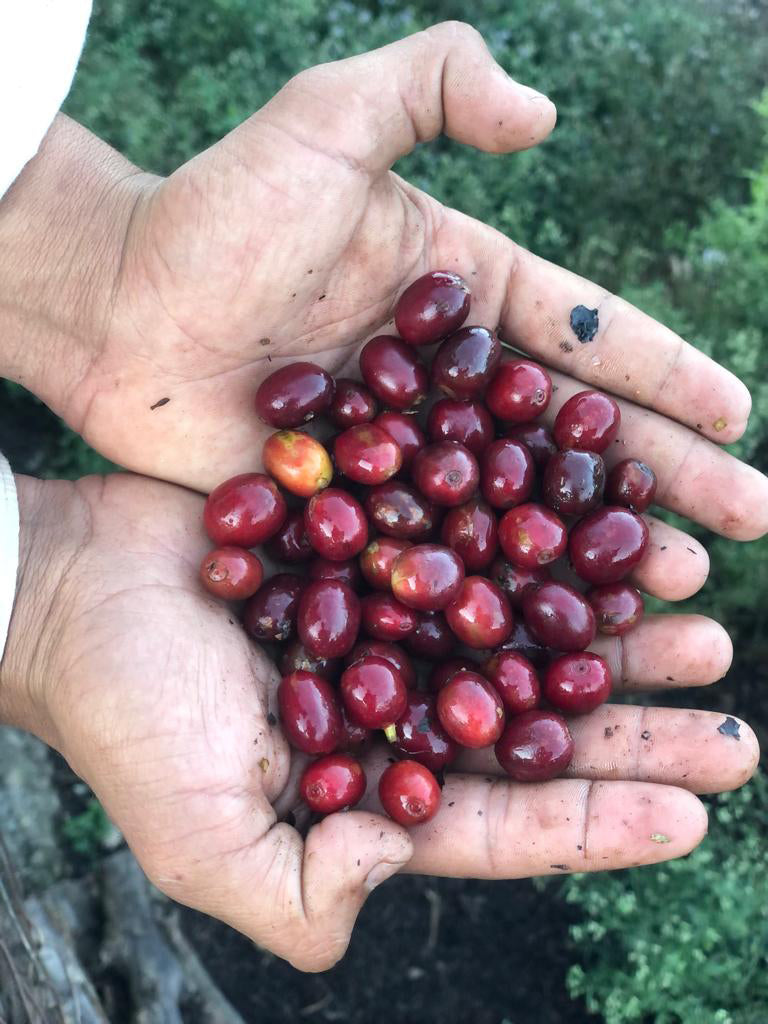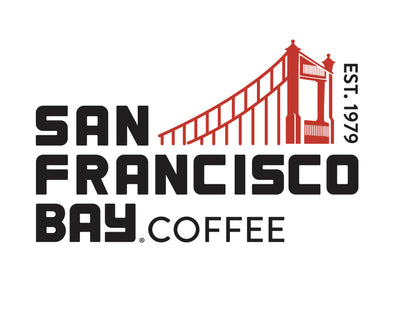Meet Our Farmers – Juana Perez, Honduras
Juana Perez and the Women Coffee Farmers of Ojaca, Honduras

Juana Perez (1955-2021), owner and coffee farmer in Ojaca, La Iguala, Lempira, Honduras.
Deep in the mountains of western Honduras, directly south of Belize and east of Guatemala, you’ll find the community of Ojaca. It’s a part of the Lempira province, in the town of La Iguala. Geographically, the area is known for its pine forests, hilly terrain, and the confluence of two rivers. It’s also a great growing region for coffee (as well as corn, beans, bananas, and pineapples). And it’s here, back in 1955, that Juana Perez was born.

Coffee country Ojaca, La Iguala, Lempira, Honduras, parcel Los Linderos.
Juana’s parents, Siríaco and Ambrosia Perez, taught Juana and her six siblings how to cross stitch and sew, how to milk cows, and most importantly – how to farm. Back then, coffee farms weren’t laid out row-upon-row as they are today. In Juana’s childhood, her parents would take her and her siblings to a nearby town, Olominas, about 15 miles south, to collect small coffee-tree saplings (chapola). They would bring the chapola back to Ojaca and plant them in the nooks and crannies on their own parcels of land. It wasn’t until years and years later that agronomists would arrive from Colombia to teach farmers more specified coffee farming techniques, and to bring seeds of coffee varietals that would thrive in that region.
When Juana was 15, she married Joaquin Rodriguez and they had six children together. As Juana’s family grew, she encouraged her husband to donate land for both the community’s school and church. She said that it would be her family that would someday benefit from these investments.

Juana Perez with her family. Left to right: Santos Rodriguez (daughter), Genesis Edith (granddaughter), Lessly Rodriguez (granddaughter), Sergio Rodriguez Jr. (grandson), Kenia Karolina (granddaughter), Kimberly Johana (great-granddaughter), Gerson Perez (grandson), Juana Perez, and Valiente the horse.
In 1985, Juana’s father, Siríaco, gave her a small plot of land. Over the years, she invested the money she earned from raising and selling chickens and pigs, as well as buying and selling coffee, into expanding the farm. In total, Juana grew her plantation to a little over 25 acres (the size of 19 football fields or 4,000 parking spaces). She then divided her farm into 12 separate parcels, each with an affectionate nickname:
- La Falda, “The Hillside,” was the first parcel that Juana purchased on her own, and it cost the equivalent of $500 USD at the time.
- El Lindero, “The Border,” was named because it separates the majority of the farm from the Puca mountain and forest reserve.
- El Calletano, is located in the town of San Miguel, Lempira and named for a river that runs through the property.
- La Pilona, “The Washbasin,” was named for an old stone water basin located on the property.
- El Tanque, “The Tank,” was the plot where Juana gifted space for the community’s water supply tank to be built.
- El Tontolo, “The Tontolo,” was named for a tropical tree that Juana preserved on the property.
- El Tacho, Avel, and Delfino, were named to remember each of the previous parcel’s owners.
- Las Vegas, “The Plains,” was named to recognize the flattest part of the farm.
- La Loma, “The Hill,” was the inheritance that her father gave her before his death.
- La Casa, “The House,” was the plot where she built her home.
 Juana’s only son, Sergio Rodriguez, with his children (L to R): Jairo Rodriguez, Lessly Rodriguez, and Sergio Rodriguez Jr.
Juana’s only son, Sergio Rodriguez, with his children (L to R): Jairo Rodriguez, Lessly Rodriguez, and Sergio Rodriguez Jr.
|
Kenia Karolina Rodriguez, Juana’s granddaughter, ready to plant coffee trees. |
Dora Marilu Rodriguez, Juana’s daughter, on horseback in the mountains surrounding Ojaca, La Iguala, Lempira. |
As her children grew, Juana gifted each of them a parcel of the greater farm system she built, so that they could cultivate coffee as well. She supported two of her daughters, Rosalina and Elida, in their studies of nursing and education, and she supported four of her grandchildren, helping them to earn their degrees in teaching, science, law, and business.
Juana’s dream, however, was always that her family would return to the coffee plantations in Ojaca and help her to carry on and improve what she had created there. In 2019, one of Juana’s grandchildren, Sergio Rodriguez, an agronomy technician, encouraged her to start a women’s cooperative in the community in order to process and commercialize specialty coffees. With Juana’s help, 20+ women from Ojaca organized themselves into a farming cooperative. Together they learned how to better care for their coffee plantations and process higher quality varietals. These women farmers began selling their coffee to the San Francisco Bay Coffee Company in 2022.

Members of cooperative of women, Mujeres Ojaca, La Iguala, Lempira, Honduras.
Sadly, Juana passed away in May of 2021 and couldn’t enjoy her cooperative’s accomplishment, but she made sure that upon her death, her remaining parcels were gifted to her grandchildren so that they could continue her family’s tradition of coffee farming. Today, her six children and 12 grandchildren continue to live in Ojaca and grow coffee.
Granddaughter Lessly loves her parcel of farm that her grandmother gifted to her. She remembers Juana fondly each day as she goes to take care of the coffee trees. She says that she learned how to farm from her father, Roberto Rodriguez Perez, Juana’s only son. He taught her to pick, de-pulp, and dry the coffee beans, as well as to plant and care for the trees.
Lessly named her farm “The Fortaleza” or “The Strength” to honor the greatest advice that her grandmother ever gave her – the strength of a woman is in her willingness to work. She dreams to someday visit the U.S. and the San Francisco Bay Coffee Company to see the final destination of her coffee beans.

Lessly Rodriguez, granddaughter of Juana Perez, teacher and coffee farmer, Ojaca, La Iguala, Lempira, Honduras.
“The people from the community always admired how lovely my grandmother’s plantation was. It was so very healthy and full of coffee beans,” Lessly says. “Juana’s secret was the love that she gave to the plants. She always talked to the coffee trees and touched them affectionately, as if they were children. She wanted the farm to look its best and visited it every day to do different maintenance activities.”
 |
 |
 |
And as you read these words, coffee from Juana’s children’s farms, her grandchildren’s farms, and farms of the women’s cooperative which she started in Ojaca, is on its way to San Francisco Bay Coffee Company and a store near you. Juana would be so proud.
****In Loving Memory of Juana Perez Perez: May 6, 1955 – May 19, 2021****
Coffee Farmer, Mother, Daughter and Friend Ojaca, La Iguala, Lempira, Honduras





